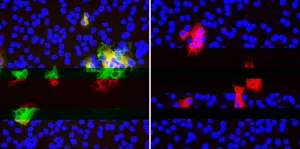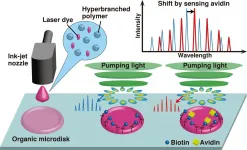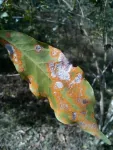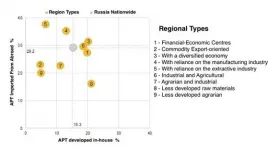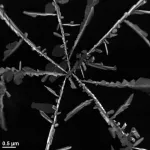Pioneering technique paves way for fast and cheap fabrication of rapid medical diagnostic tools
Breakthrough promises to democratise microfluidics and lab-on-a-chip technology, benefiting resource-poor countries and settings
2021-02-03
(Press-News.org) New technology developed by the University of Bristol has the potential to accelerate uptake and development of on-chip diagnostic techniques in parts of the world where rapid diagnoses are desperately needed to improve public health, mortality and morbidity.
Microfluidic devices underpin lab-on-a-chip (LOC) technologies which are developed to provide the rapid diagnoses at that are needed at point of care (POC) for the swift and effective treatment of many diseases.
Researchers at Bristol have developed a fast, reliable and cost-effective alternative for producing the soft-lithographic moulds used for fabricating microfluidic devices, published in the journal PLOS ONE. This discovery means fabrication of microfluidic devices (with channel dimensions ~width of a human hair) is now both accessible and affordable using simple, low-cost 3D-printing techniques and the open-source resources developed by the team.
"Previously, techniques for producing the soft-lithographic scaffolds/moulds (microfluidic channel patterns) were time-consuming and extremely expensive, while other low-cost alternatives were prone to unfavourable properties. This development could put LOC prototyping into the hands of researchers and clinicians who know the challenges best, in particular those in resource-limited settings, where rapid diagnostics may often have the greatest impact," said lead author of the study, Dr Robert Hughes.
"This technique is so simple, quick & cheap that devices can be fabricated using only everyday domestic or educational appliances and at a negligible cost (~0.05% of cost of materials for a single microfluidic device). This means researchers and clinicians could use our technique and resources to help fabricate rapid medical diagnostic tools, quickly and cheaply, with minimal additional expertise or resources required," said co-author, Mr Harry Felton.
"The simplicity and minimal cost of this technique, as well as the playful click-and-connect approach developed, also makes it suitable for hobbyists and educational use, to teach about microfluidics and the applications of lab-on-a-chip technology," said co-author Ms Andrea Diaz Gaxiola.
"It is our hope that this will democratise microfluidics and lab-on-a-chip technology, help to advance the development of point-of-care diagnostics, and inspire the next generation of researchers and clinicians in the field," said Dr Hughes.
The next step for the team is to identify potential collaborators in both research and education to help demonstrate the impact this technology could have in both settings by developing and supporting outreach activities and applications for on-chip diagnostic testing.
INFORMATION:
Paper: 'Negligible-cost microfluidic device fabrication using 3D-printed interconnecting channel scaffolds,' by Felton, H., Hughes, R., & Diaz-Gaxiola, A., in PLOS ONE.
[Attachments] See images for this press release:
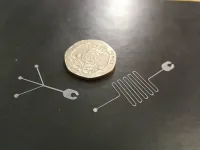
ELSE PRESS RELEASES FROM THIS DATE:
2021-02-03
PITTSBURGH, Feb. 3, 2020 - In a recurring pattern of evolution, SARS-CoV-2 evades immune responses by selectively deleting small bits of its genetic sequence, according to new research from the University of Pittsburgh School of Medicine.
Since these deletions happen in a part of the sequence that encodes for the shape of the spike protein, the formerly neutralizing antibody can't grab hold of the virus, the researchers report today in Science. And because the molecular "proofreader" that usually catches errors during SARS-CoV-2 replication is "blind" to fixing deletions, they become cemented into the variant's genetic material.
"You can't ...
2021-02-03
Researchers have identified a pattern of deletions in the spike (S) glycoprotein of SARS-CoV-2 that can prevent antibody binding. Virus lineages featuring this mechanism are currently being transmitted between individuals globally, they say. Their results - reported after analyzing nearly 150,000 S gene sequences collected from many parts of the world - exhibit a form of virus "escape" that resulted from a common, strong selective pressure; for example, the authors identified at least nine instances where deletion variants arose in patients whose COVID-19 infections were persistent. So far, the strongest indicator of protection against SARS-CoV-2 appears to be humoral immunity, such as by antibodies, ...
2021-02-03
WASHINGTON -- Researchers have developed a unique inkjet printing method for fabricating tiny biocompatible polymer microdisk lasers for biosensing applications. The approach enables production of both the laser and sensor in a room temperature, open-air environment, potentially enabling new uses of biosensing technologies for health monitoring and disease diagnostics.
"The ability to use an inexpensive and portable commercial inkjet printer to fabricate a sensor in an ambient environment could make it possible to produce biosensors on-site as needed," said research team leader Hiroaki Yoshioka from Kyushu University in Japan. "This could help make biosensing widespread even in economically disadvantaged ...
2021-02-03
Coffee rust is a parasitic fungus and a big problem for coffee growers around the world. A study in the birthplace of coffee - Ethiopia - shows that another fungus seems to have the capacity to supress the rust outbreaks in this landscape.
"Coffee leaf rust is a fungal disease that is a problem for coffee growers around the world, especially on Arabica coffee, which accounts for three quarters of global coffee production and has the finest cup quality. There is a need to learn more about natural solutions instead of just applying pesticides," says Kristoffer Hylander, professor at the Department of Ecology, Environment and Plant Sciences (DEEP) at Stockholm ...
2021-02-03
Many nations place drugs into various schedules or categories according to their risk of being abused and their medical value. At times, drugs are rescheduled to a more restrictive category to reduce misuse by constricting supply. A new study examined lessons from past efforts worldwide to schedule and reschedule drugs to identify general patterns and found that rescheduling drugs can lower use as well as the dangers associated with the drug. The findings have implications for policy.
The study, by researchers at Carnegie Mellon University (CMU), is published in the International Journal of Drug Policy.
"Our review suggests that rescheduling drugs can often disrupt trends in prescribing, use, or harms," says Jonathan Caulkins, professor of operations research and public policy at CMU's ...
2021-02-03
In the first longitudinal study to follow Georgia pre-K students through middle school, Stacey Neuharth-Pritchett, associate dean for academic programs and professor in UGA's Mary Frances Early College of Education, found that participating in pre-K programs positively predicted mathematical achievement in students through seventh grade.
"Students who participated in the study were twice as likely to meet the state standards in their mathematics achievement," said Neuharth-Pritchett. "School becomes more challenging as one progresses through the grades, and so if ...
2021-02-03
Russian enterprises have limited opportunities to carry out technological modernisation on their own. Their technological portfolios reveal a high dependence on imported solutions and a limited deployment of their own developments, HSE University researchers discovered.
In recent years, there has been a growing demand for the use of advanced manufacturing technologies (AMT) in Russia. Between 2011 and 2018, the number of AMT used increased by 33%, and in 2018 they amounted to almost 255,000 units in absolute terms. Meanwhile, innovation strategies focused on independent development of novel manufacturing solutions are not widespread in Russia. Fewer than ...
2021-02-03
GROUND-BREAKING research from the University of Huddersfield, announced ahead of World Cancer Day 2021, proves that scalp cooling physically protects hair follicles from chemotherapy drugs. It is the world's first piece of biological evidence that explains how scalp cooling actually works and the mechanism behind its protection of the hair follicle.
The study, entitled 'Cooling-mediated protection from chemotherapy drug-induced cytotoxicity in human keratinocytes by inhibition of cellular drug uptake', has been published in the peer-reviewed journal PLOS ONE .
The data was part of an innovative hair follicle research project carried out by the dedicated Scalp Cooling ...
2021-02-03
Antimicrobial packaging is being developed to extend the shelf life and safety of foods and beverages. However, there is concern about the transfer of potentially harmful materials, such as silver nanoparticles, from these types of containers to consumables. Now, researchers reporting in ACS Applied Materials & Interfaces illustrate that silver embedded in an antimicrobial plastic can leave the material and form nanoparticles in foods and beverages, particularly in sweet and sugary ones.
Some polymers containing nanoparticles or nanocomposites can slow ...
2021-02-03
In the Namib Desert in southwestern Africa, the Kuiseb River, an ephemeral river which is dry most of the year, plays a vital role to the region. It provides most of the vegetation to the area and serves as a home for the local indigenous people, and migration corridor for many animals. The overall vegetation cover increased by 33% between 1984 and 2019, according to a Dartmouth study published in Remote Sensing .
The study leveraged recent drone imagery and past satellite imagery to estimate past vegetation cover in this linear oasis of the Kuiseb River, a fertile area in the middle of one of the driest deserts ...
LAST 30 PRESS RELEASES:
[Press-News.org] Pioneering technique paves way for fast and cheap fabrication of rapid medical diagnostic tools
Breakthrough promises to democratise microfluidics and lab-on-a-chip technology, benefiting resource-poor countries and settings

